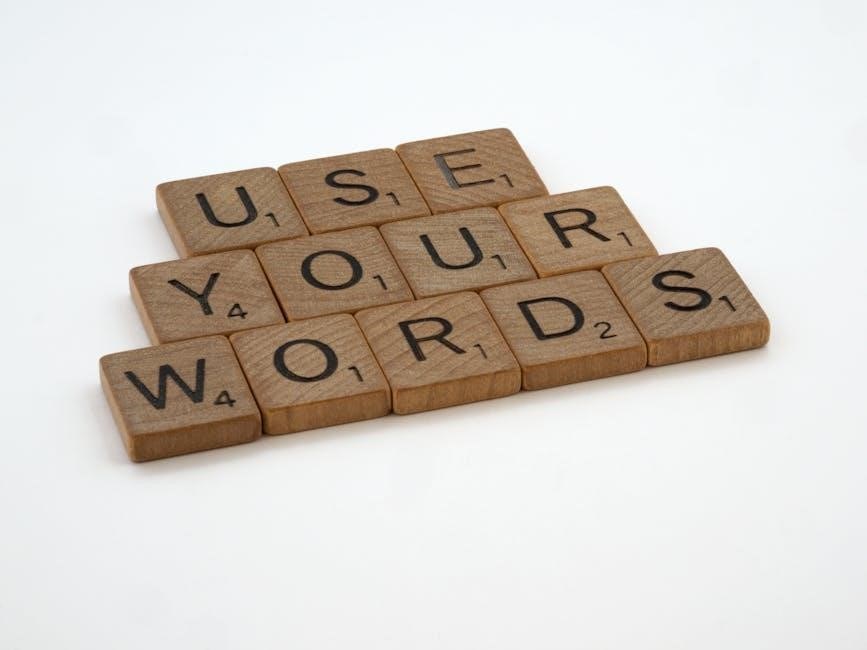Mastering vocabulary in 5th grade is crucial for reading success and academic growth. This section introduces essential words and resources like PDF worksheets to enhance language skills effectively.
1.1 Importance of Vocabulary in 5th Grade
Mastering vocabulary in 5th grade is essential for reading comprehension, communication, and academic success. A strong vocabulary enhances understanding of complex texts, improves writing skills, and boosts confidence in expressing ideas. Students who achieve this goal typically score high on national reading tests and excel in future grades. Vocabulary skills also lay the foundation for lifelong learning, enabling students to engage with a wider range of materials. Using resources like PDF worksheets ensures consistent practice and reinforces word meanings, making vocabulary acquisition both effective and manageable.
1.2 Overview of the 5th Grade Vocabulary List
The 5th grade vocabulary list is designed to include words that are essential for advanced reading comprehension and communication. It features a mix of high-frequency words, Common Core-aligned terms, and challenging vocabulary from literature and tests. The list is structured to build on previous grades, ensuring a progressive learning curve. Resources like PDF worksheets provide definitions, context clues, and exercises such as synonyms, antonyms, and word puzzles. This comprehensive approach helps students master approximately 100-200 key words, enabling them to read at higher grade levels and perform well on standardized tests. The list is tailored to meet academic demands and prepare students for future success.
1.3 Benefits of Using PDF Resources for Vocabulary Learning
Using PDF resources for 5th grade vocabulary learning offers numerous benefits. These resources are easily accessible, printable, and can be used anywhere, making them ideal for both classroom and home learning. PDF worksheets often include a variety of engaging exercises, such as word searches, crosswords, and matching games, which make learning fun and interactive. They also provide clear definitions, context clues, and practice opportunities for high-frequency and challenging words. Additionally, PDF guides are customizable, allowing teachers and parents to tailor activities to individual needs. This format ensures consistent practice, helping students build a strong foundation in vocabulary and improve their overall language skills effectively.
Key Components of 5th Grade Vocabulary
The 5th grade vocabulary curriculum includes Common Core-aligned words, high-frequency terms, and words that enhance reading comprehension. It also covers synonyms, antonyms, and context-based learning for mastery.
2.1 Common Core Aligned Vocabulary Words
The 5th grade vocabulary list is carefully aligned with Common Core standards, ensuring students master words that meet national educational expectations. These vocabulary words are selected to enhance reading comprehension, writing skills, and critical thinking. Resources like PDF workbooks and vocabulary cards provide structured learning, organizing words alphabetically for easy reference. Teachers can use these tools to create engaging lessons, fostering a strong foundation in language arts. By focusing on Common Core-aligned terms, students develop the skills needed for academic success, including understanding complex texts and communicating ideas effectively. These words are essential for building a robust vocabulary that supports lifelong learning and achievement.
2.2 High-Frequency Words for 5th Graders
High-frequency vocabulary words are essential for 5th graders to recognize and use fluently. These words appear regularly in texts and are crucial for reading comprehension and communication. They often include terms like “analyze,” “evaluate,” and “synthesize,” which are vital for academic success. Mastering these high-frequency words helps students build a strong foundation in language arts. Resources such as PDF worksheets and vocabulary lists provide structured practice, ensuring students can identify and use these words confidently. Regular practice with these terms enhances reading fluency and prepares students for more complex texts in higher grades. These words are selected to align with curriculum standards and support overall vocabulary growth.
Focused on Reading Comprehension
Mastering vocabulary words that enhance reading comprehension is vital for 5th graders. These words are selected to help students understand complex texts and improve their ability to make inferences, identify themes, and analyze passages. They often include terms like “context clues,” “inferences,” and “summarize,” which are critical for interpreting literature and informational texts. PDF resources and practice exercises focus on these words to ensure students can apply them effectively. By learning these terms, students develop a stronger grasp of narrative and expository writing, enabling them to engage more deeply with what they read. These vocabulary words are designed to build a foundation for lifelong reading success. Regular practice with these terms is essential for academic achievement.
Teaching Strategies for Vocabulary Development
Effective strategies include interactive activities, context clues, and games to engage students. Using PDF worksheets and puzzles enhances learning, making vocabulary practice fun and impactful for 5th graders.
3.1 Interactive Activities for Vocabulary Building
Interactive activities are essential for engaging 5th graders in vocabulary learning. Word searches, crosswords, and jumbled words encourage hands-on practice. Matching games and context clue exercises help students connect words with meanings. Sentence completion tasks and homophone exercises enhance understanding. Incorporating technology, such as educational apps and online platforms, makes learning dynamic. Group activities like word walls and vocabulary charades foster collaboration. These methods ensure that students not only memorize words but also understand their usage in different contexts, making vocabulary building both fun and effective. Regular practice through these activities strengthens language skills and prepares students for advanced learning.
3.2 Using Context Clues to Understand Word Meanings
Context clues are powerful tools for 5th graders to decipher unfamiliar words. By analyzing surrounding sentences, students can infer meanings. Activities like matching phrases and fill-in-the-blank exercises help practice this skill. Word definitions and context-based puzzles reinforce understanding. Teachers can use passages with missing words, allowing students to choose the best fit. Homophone exercises also aid in understanding word nuances. These strategies make learning interactive and effective, ensuring students grasp word meanings in different contexts. Regular practice with context clues enhances reading comprehension and vocabulary retention, preparing students for more complex texts.
3.3 Incorporating Games and Puzzles for Engagement
Incorporating games and puzzles into vocabulary practice makes learning fun and interactive. Word searches, crosswords, and jumbled words are popular activities that challenge students to think critically. Link-the-words exercises and word mazes also engage students while reinforcing word recognition. These tools, often available in PDF formats, provide a variety of ways to practice vocabulary. Games like homophone matching and synonym/antonym crosswords add an element of competition, motivating students to learn. Free, printable resources make it easy for teachers and parents to implement these activities, ensuring students stay engaged and develop a strong foundation in vocabulary.

Worksheets and Printable Resources
Free 5th grade vocabulary PDFs offer engaging exercises like word searches, crosswords, and synonym/antonym matches. These printable resources make learning fun and effective for students.

4.1 Free 5th Grade Vocabulary Worksheets in PDF
Free 5th grade vocabulary worksheets in PDF format provide a variety of engaging exercises to enhance word knowledge. These printable resources include word searches, crosswords, and activities focused on synonyms, antonyms, homophones, and context clues. Designed to be fun and educational, they help students improve reading comprehension and language skills. Many worksheets feature comprehensive lists of vocabulary words with definitions, making them ideal for classroom or home use. Teachers and parents can customize these PDFs to suit individual learning needs, ensuring students stay motivated and challenged. Downloading these free resources is a great way to support vocabulary growth and prepare students for academic success.
4.2 Word Search, Crosswords, and Jumbled Words
Engage students with interactive activities like word search, crosswords, and jumbled words to make vocabulary learning fun. These exercises, often available in PDF format, help students recognize and spell words while improving retention. Word searches enhance visual recognition, while crosswords challenge students to use context clues. Jumbled words encourage spelling practice and problem-solving skills. These activities are ideal for classroom use or homework, promoting a deeper understanding of vocabulary. Many resources include answer keys for easy grading; By incorporating these engaging exercises, students can build their vocabulary in an enjoyable and interactive way, making learning more effective and memorable. These tools are widely available online for free, offering convenience for teachers and parents alike.
4.3 Synonyms, Antonyms, and Homophone Exercises
Enhance vocabulary skills with exercises focusing on synonyms, antonyms, and homophones. These activities help students understand word relationships and context. Synonyms and antonyms exercises improve comprehension of word meanings, while homophone tasks clarify sound-alike words. Worksheets often include matching games, fill-in-the-blank sentences, and word banks. These exercises are available in PDF format, making them easy to print and use. They encourage critical thinking and precise language use, essential for reading and writing. By mastering these concepts, students gain a stronger command of vocabulary, enhancing their communication skills. These resources are ideal for classroom or home use, providing interactive and engaging learning opportunities for 5th graders.

Assessing Vocabulary Knowledge
Evaluate students’ understanding with quizzes, tests, and flashcards; These tools reinforce learning and track progress, ensuring mastery of 5th grade vocabulary words effectively.
5.1 Quizzes and Tests for Vocabulary Mastery
Quizzes and tests are essential tools for assessing vocabulary mastery in 5th grade. They help identify gaps in understanding and track progress over time. PDF resources often include multiple-choice questions, fill-in-the-blank exercises, and matching games. These assessments can be printed and distributed easily, making them convenient for classroom or home use. Many quizzes focus on high-frequency words, synonyms, antonyms, and context clues. Teachers and parents can use these tests to evaluate students’ ability to define and use words correctly. Regular testing reinforces learning and ensures students are well-prepared for standardized exams. Free downloadable PDF quizzes are widely available online, offering a variety of engaging and educational exercises.
5.2 Using Flashcards for Quick Revision
Flashcards are a popular and effective tool for quick vocabulary revision. They allow students to memorize words and their meanings efficiently. Each flashcard typically features a word on one side and its definition, synonym, or usage example on the other. This format enables self-testing and reinforces memory retention. Flashcards can be used anywhere, making them ideal for on-the-go learning. Many PDF resources include printable flashcard templates, which can be customized to focus on specific word lists. Teachers and parents can create sets targeting high-frequency words, synonyms, antonyms, or context clues. Regular use of flashcards helps build confidence and ensures mastery of 5th grade vocabulary words.
5.3 Creative Projects to Demonstrate Understanding
Creative projects are an engaging way for students to showcase their grasp of 5th grade vocabulary words. Activities like creating word walls, designing vocabulary cards, or crafting short stories using target words encourage deeper understanding. Students can also develop crossword puzzles or word searches using PDF templates, reinforcing their knowledge. Additionally, projects such as illustrating definitions or performing skits with vocabulary words make learning interactive and fun. These exercises not only assess comprehension but also foster critical thinking and creativity. By applying words in meaningful contexts, students build confidence and develop a lasting command of their vocabulary, making these projects a valuable tool for effective learning.

Resources for Teachers and Parents
Discover downloadable PDF guides, online tools, and recommended workbooks to support 5th grade vocabulary learning. These resources provide engaging activities and structured lessons for effective skill development.
6.1 Downloadable PDF Guides for 5th Grade Vocabulary
Downloadable PDF guides offer a comprehensive approach to 5th grade vocabulary learning. These resources provide lists of essential words, definitions, and exercises to enhance understanding. Many guides are free and align with Common Core standards, ensuring relevance and effectiveness. They often include activities like synonyms, antonyms, and context clues to engage students. Parents and teachers can use these guides to create structured lessons or homework assignments. Additionally, some PDFs feature word searches, crosswords, and jumbled words for interactive learning. These guides are ideal for reinforcing classroom instruction and fostering independent study. They are easily accessible and printable, making them a valuable tool for vocabulary mastery.
6.2 Online Tools for Vocabulary Practice
Online tools provide interactive and engaging ways for 5th graders to practice vocabulary. Platforms like Google Drive offer accessible resources, while educational apps and websites feature games, quizzes, and exercises. These tools often include flashcards, word searches, and crosswords to make learning fun. Many platforms allow customization, enabling teachers to create tailored activities. Interactive exercises help students grasp word meanings through context clues and synonyms. Additionally, online tools track progress, providing feedback and identifying areas for improvement. They cater to different learning styles, making vocabulary practice enjoyable and effective. These resources are invaluable for both classroom and home use, supporting consistent skill development.
6.3 Recommended Workbooks and Learning Packets
Recommended workbooks and learning packets for 5th grade vocabulary provide structured and comprehensive resources for mastering essential words. These materials often include lists of high-frequency words, synonyms, antonyms, and context clues. Workbooks like “100 Vocabulary Words Kids Need to Know by 5th Grade” offer practical exercises to reinforce learning. Learning packets may include activities such as word searches, crosswords, and fill-in-the-blank sentences. Many resources are aligned with Common Core standards, ensuring relevance and effectiveness. These workbooks and packets are ideal for both classroom use and home practice, helping students build a strong foundation in vocabulary. They are designed to engage learners and make vocabulary acquisition fun and meaningful.

Advanced Vocabulary Building Techniques
Advanced techniques include learning prefixes, suffixes, and literary devices like similes and metaphors. These methods enhance understanding and expand vocabulary through engaging and effective strategies.

7.1 Learning Prefixes and Suffixes
Learning prefixes and suffixes is a powerful way to decode unfamiliar words. These word parts often carry specific meanings, helping students infer definitions. For example, the prefix re- means “again,” while the suffix -able suggests “capable of.” Understanding these components enhances vocabulary acquisition and improves reading comprehension. Worksheets and exercises in PDF resources focus on identifying and applying prefixes and suffixes. Interactive activities, such as matching games and word-building exercises, make learning engaging. This skill is particularly useful for tackling complex words in advanced texts, preparing students for higher-grade challenges. By mastering prefixes and suffixes, 5th graders gain a foundational tool for lifelong vocabulary growth.

7.2 Understanding Similes, Metaphors, and Idioms
Mastering similes, metaphors, and idioms enhances vocabulary and reading comprehension. Similes compare using “like” or “as,” e.g., “She ran like a cheetah.” Metaphors equate without comparison words, like “The world is a stage.” Idioms, such as “It’s raining cats and dogs,” convey unique meanings. These literary devices enrich language and expression. Worksheets in PDF resources include exercises like matching games, crosswords, and fill-in-the-blank sentences. Activities focus on identifying and creating similes, metaphors, and idioms, helping students decode complex texts. Understanding these concepts improves critical thinking and vocabulary retention, preparing 5th graders for advanced reading challenges and fostering creative communication skills.
7.3 Expanding Vocabulary Through Reading
Reading is a powerful tool for expanding vocabulary in 5th grade. Exposure to diverse texts introduces students to new words in context, enhancing understanding and retention. PDF resources, such as workbooks and reading packets, often include passages with challenging vocabulary. Students learn to use context clues to decode unfamiliar words, improving comprehension. For example, encountering phrases like “The world is a stage” in literature helps students grasp figurative language. Regular reading fosters a deeper connection with words, making them easier to recall and use. By engaging with various genres, students broaden their vocabulary and develop a lifelong love for learning and reading. This approach ensures meaningful and lasting vocabulary growth.

The Role of Technology in Vocabulary Learning
Technology enhances vocabulary learning through interactive apps, online platforms, and PDF resources. Tools like educational apps and Google Drive provide engaging, accessible ways for students to practice and master new words.
8.1 Educational Apps for Vocabulary Practice
Educational apps like Duolingo, Quizlet, and Kahoot! offer interactive and engaging ways for 5th graders to practice vocabulary. These apps provide flashcards, games, and quizzes that make learning fun. Many apps allow students to track progress, set goals, and compete with peers. Features like audio pronunciations and visual aids enhance understanding. Apps often align with curriculum standards, ensuring relevance. Offline access makes learning convenient. Parents and teachers can monitor progress through detailed reports. Interactive exercises, such as matching games and word scrambles, reinforce retention. These tools cater to different learning styles, making vocabulary practice enjoyable and effective for all students. They are invaluable resources for supplementing traditional learning methods.
8.2 Google Drive Resources for 5th Grade Vocabulary
Google Drive offers a wealth of resources for 5th grade vocabulary learning, including downloadable PDF guides, vocabulary cards, and interactive worksheets. These materials are easily accessible from any device, making them ideal for remote learning. Teachers and parents can share folders containing vocabulary lists, exercises, and activities, ensuring everyone stays connected. Many resources are aligned with Common Core standards, providing structured learning. Features like version history and real-time collaboration make it easy to update and distribute materials. With Google Drive, students can access practice sheets, word games, and study guides anytime, fostering independent learning and reinforcing vocabulary skills effectively.
8.3 Interactive Online Platforms for Word Learning
Interactive online platforms offer engaging ways for 5th graders to learn vocabulary. These tools feature games, puzzles, and activities that make word learning fun and effective. Many platforms provide multimedia elements like audio pronunciations and visual aids to cater to different learning styles. Students can practice with flashcards, quizzes, and word-building exercises, receiving immediate feedback to track their progress. Platforms like K5 Learning and educational apps offer customizable lessons and interactive exercises tailored to 5th-grade curriculum standards. These resources are accessible from any device, making it easy for students to practice vocabulary anytime, anywhere, while staying motivated and engaged in their learning journey.
Mastery of 5th grade vocabulary is essential for academic success. Utilizing PDF resources and interactive tools fosters lifelong learning and enhances language skills effectively for future challenges.
9.1 Summarizing the Importance of Vocabulary Mastery
Vocabulary mastery in 5th grade is vital for reading comprehension, communication, and academic success. It enhances critical thinking and prepares students for advanced learning. Utilizing resources like PDF worksheets ensures consistent practice, while interactive activities and word lists foster engagement. Mastering these words boosts confidence, improves writing skills, and lays a strong foundation for future challenges. By prioritizing vocabulary, students develop a lifelong love for learning and achieve greater success in all subjects.
9.2 Encouraging Lifelong Learning Through Vocabulary
Mastering 5th grade vocabulary lays the groundwork for a lifelong love of learning. By building a strong foundation in word knowledge, students develop skills that benefit them beyond elementary school. Vocabulary enhances reading comprehension, critical thinking, and communication, fostering curiosity and a desire to explore new ideas. Engaging with resources like PDF worksheets and interactive activities makes learning enjoyable and sustainable. As students progress, their vocabulary skills enable them to tackle more complex texts and concepts, preparing them for higher grades and real-world challenges. Encouraging vocabulary practice at this stage cultivates a mindset of continuous growth and intellectual exploration.
9.3 Final Tips for Effective Vocabulary Practice

Consistent practice is key to mastering 5th grade vocabulary. Use PDF guides and flashcards for quick revision. Engage in interactive activities like word searches and crosswords to make learning fun. Encourage reading diverse texts to apply new words in context. Discuss word meanings with peers or teachers to deepen understanding. Celebrate progress, no matter how small, to keep motivation high. Incorporate technology, such as educational apps, for personalized practice. Make vocabulary a part of daily routines, like learning one new word each day. By combining these strategies, students can build a robust vocabulary foundation that supports lifelong learning and academic success.




Be the first to reply